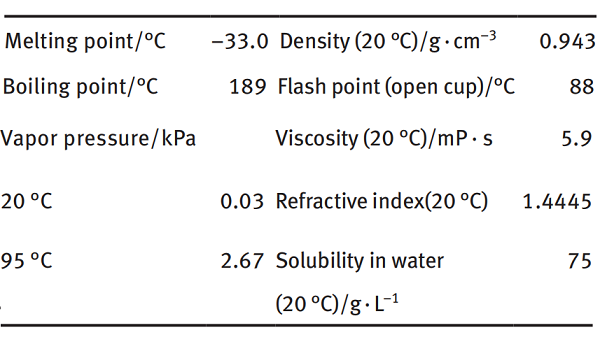The uses of 1,4-Butanediol vinyl ether
Mar 18,2024
4-Hydroxybutyl vinyl ether, abbreviated as HBVE, also known as 1,4-butanediol vinyl ether, 4-vinyloxybutanol, butanediol monovinyl ether, tetramethylene glycol monovinyl ether and vinyl 4-hydroxybutyl ether, is a derivative of 1,4-butanediol and acety lene. CAS Registry Number: 17832-28-9. Molecular formula: C6H12O2, molecular weight: 116.16. It is a colorless or light yellow transparent liquid with a slight odor similar to ether.

HBVE as a comonomer for fluoro resin
Homopolymers and copolymers of fluorine-containing monomers can only be used for high-temperature thermoplastic coatings, and they have poor wettability to pigments and fillers as well as weak adhesion on the substrate surface. Therefore, some non-fluorine-containing monomers with polar cross-linking groups are usually added for copolymerization during the synthesis of fluoro resin to ensure the compatibility of the resin and other additives, and these materials can be cross-linked and cured at room temperature. For example, fluorine-containing monomers, functional monomers, and HBVE are subjected to solution polymerization in an autoclave, leading to fluoro resin with excellent resistance to weather, oil, stain, water, solvent, chemical substances, tensile toughness, and very low friction coefficient, so that it has a wide range of uses in the fields of special anti-corrosion coatings, wear-resistant coatings, and super-weatherable building coatings. fluoro resinFluororesin materials are widely used in aerospace, industrial engineeringengineering, textile finishing, special protective coatings, microelectronics, and other fields.
Application in coatings
The cathodic electrophoretic coating prepared by copolymerization of fluoro olefin, vinyl ether, carboxyl-containing compound, and water-soluble amino resin is a good waterborne fluoropolymer coating, which not only has the performance of pollution resistance and corrosion resistance of fluorine-containing materials but also has good water solubility and construction performance, safety, and environmental protection. The reactive diluent is an important part of radiation-curing coatings, which is used to adjust the coating's viscosity and final properties. At present, the commonly used active diluents are acrylic esters, which have high volatility, low flash points, irritating odor, and high toxicity. many acrylic monomers are well-known carcinogens, so the environmental pollution problems caused by using acrylic monomers are difficult to overcome. Vinyl ethers, which have advantages including low toxicity, low viscosity, and easy synthesis, are an excellent active diluent and are used in paints, inks, adhesives, pressure-sensitive adhesives, surface modifiers, and molding materials. With the development of solvent-free coatings, HBVE will continue to expand. Like free-radical UV-curing coatings, cationic UV-curing coatings are solvent-free coatings, which have advantages including saving energy, reducing air pollution, fast curing speed, less land occupation, suitable for automatic assembly line coating and are especially suitable for the coating of substrates that cannot be heated. Modified epoxy resin UV-curing coating using HBVE as a reactive diluent has the advantages of fast curing, high gloss, good abrasion resistance, strong adhesion, excellent flexibility, and low viscosity, which have been applied in the coating of beverage cans.
- Related articles
- Related Qustion
Glycerin is produced industrially, usually as a by-product of soap manufacture, from oils and fats. It can be made from animal fat or, in the case of vegetable glycerin, vegetable oil.....
Mar 18,2024Biochemical EngineeringGraphite is a is a form of carbon and a non-metal but the only non-metal can conduct electricity. It is an excellent conductor of heat and electricity and has the highest natural strength and stiffness of any material.....
Mar 18,2024Inorganic chemistry1,4-Butanediol vinyl ether
17832-28-9You may like
- Is dimethyl disulfide a natural product?
May 22, 2024
- What is the effect of water on 3-aminopropyltriethoxysilane (APTES)?
May 17, 2024
- The solubility of Succinic anhydride
May 11, 2024
1,4-Butanediol vinyl ether manufacturers
- 1,4-Butanediol monovinyl ether
-

- $8.00 / 1KG
- 2024-01-22
- CAS:17832-28-9
- Min. Order: 1KG
- Purity: 99%
- Supply Ability: g-kg-tons, free sample is available
- 1,4-Butanediol vinyl ether
-

- $40.00 / 1kg
- 2023-09-12
- CAS:17832-28-9
- Min. Order: 1kg
- Purity: 0.99
- Supply Ability: 10 tons
- 4-(Vinyloxy)-1-butanol
-

- $200.00 / 1kg
- 2023-06-26
- CAS:17832-28-9
- Min. Order: 1kg
- Purity: 99%
- Supply Ability: 500kg/Month





